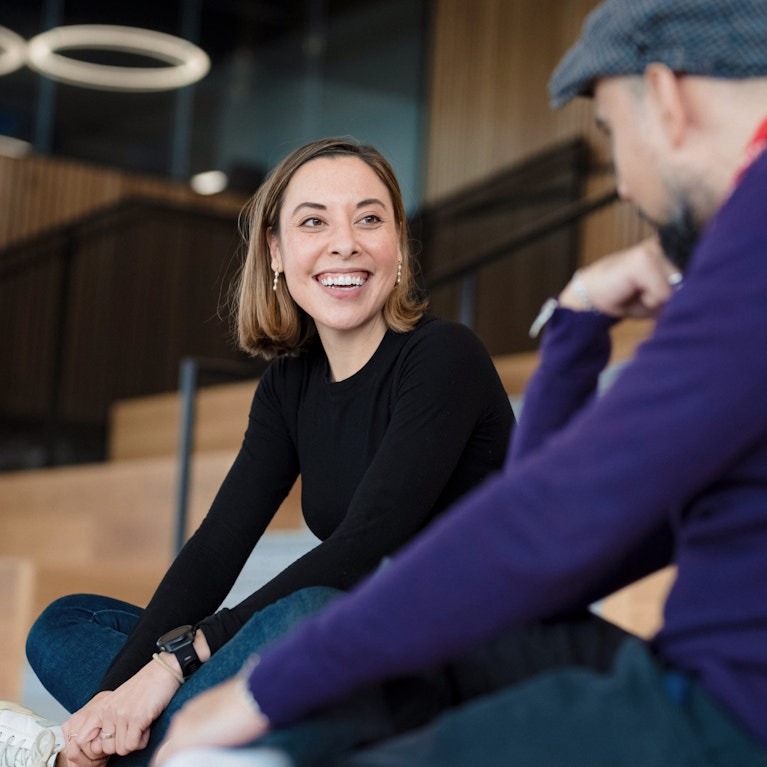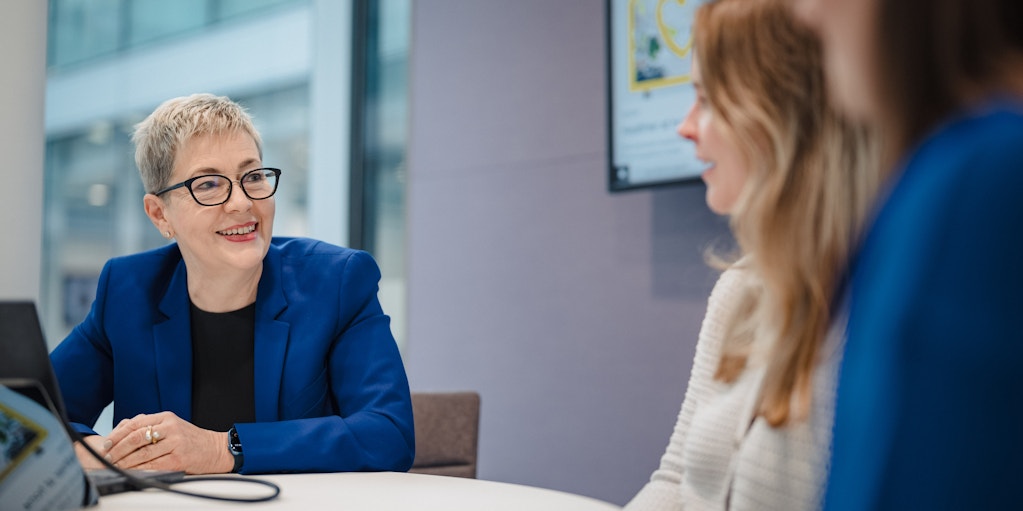
15 minutes with: Hilary Thomas
Tags
Our experts are at the forefront of bringing ingenuity to life for our clients. They accelerate new growth ideas from concept, through design and development to commercial success. And they revitalise organisations with the leadership, culture, systems and processes to make innovation a reality.
In this series, you’ll meet some of the brilliant minds creating change every day.
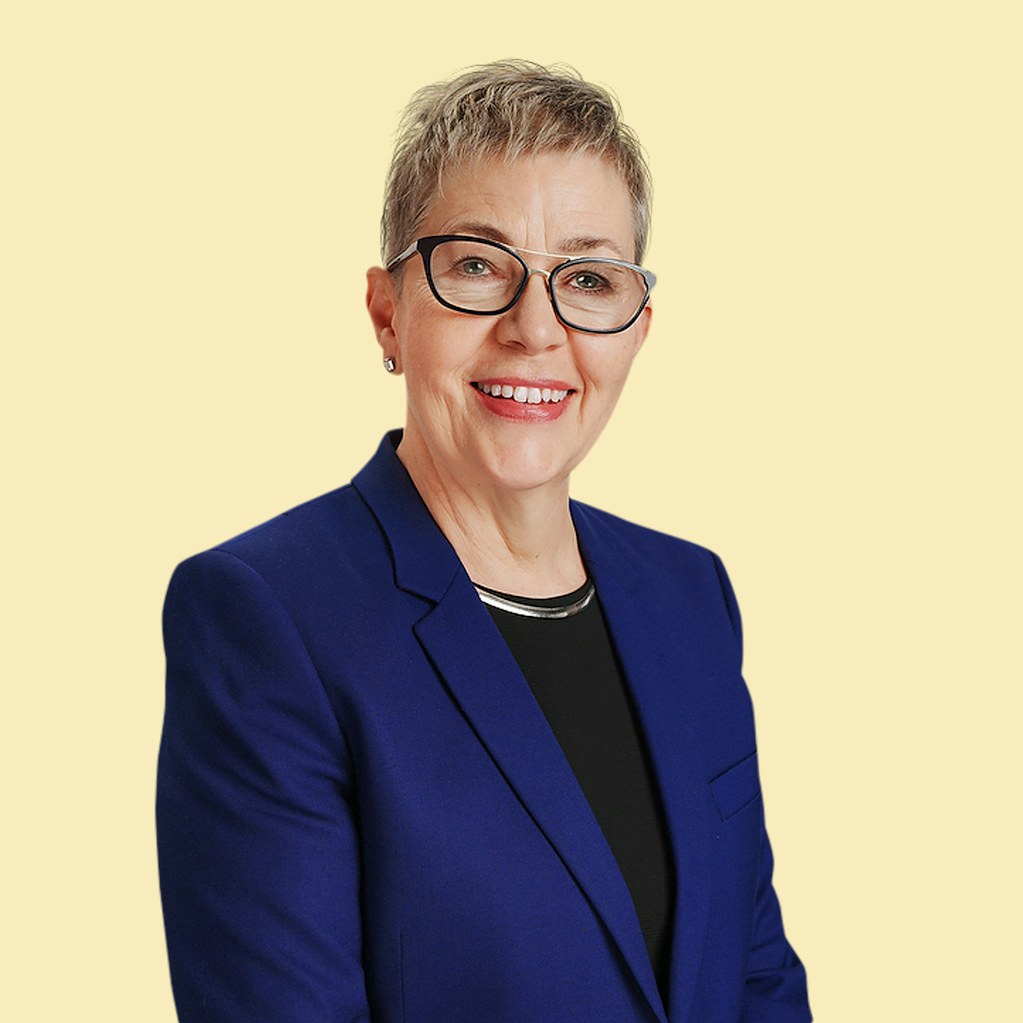
What is your background and what brought you to PA?
Right from the age of nine, I wanted to be a doctor. And as a student I was intrigued by oncology and made an early decision that it was the specialty I wanted to pursue, and I really loved it. I became Professor of Oncology at the University of Surrey and then moved towards medical management, becoming Medical Director. I started to think that I could shape healthcare for patients more effectively by running a hospital, as opposed to just delivering a service within a hospital.
At PA, healthcare and life sciences sit together (which is certainly not common in consultancies), and the opportunity to be able to work in both was very attractive.
What’s different about PA as opposed to another consultancy? Why would a client come to us?
The thing I was really excited about when I was approached about PA was the scientific and engineering heritage, product development, being much closer to the coalface, and interacting with patients and scientists. I had never previously seen anything like PA’s Global Innovation and Technology Centre (GITC) in Cambridge. There was that history of making stuff, which I think is a real differentiator and a tangible reason why people come to PA. There’s a huge richness of expertise in design, engineering, and science. People at PA have a depth of expertise and experience that I don’t think you find in other consultancies.
How would you describe what you do to somebody who wasn’t familiar with consulting?
I always say that I work at the interface between healthcare and life sciences. One of the reasons I love consulting is no two days are the same. I bring insights and experience about challenges faced by both healthcare and life sciences organisations, and I use those insights to enable people to be more effective and get further, faster. That might be how to design a clinical trial more effectively and increase the number of recruits for that clinical trial. It might be how to interface with different markets and understand the key characteristics in different countries. It might be supporting clinical leaders in hospitals or integrated care systems. I’m helping them to do that by advising, supporting, and providing insights.
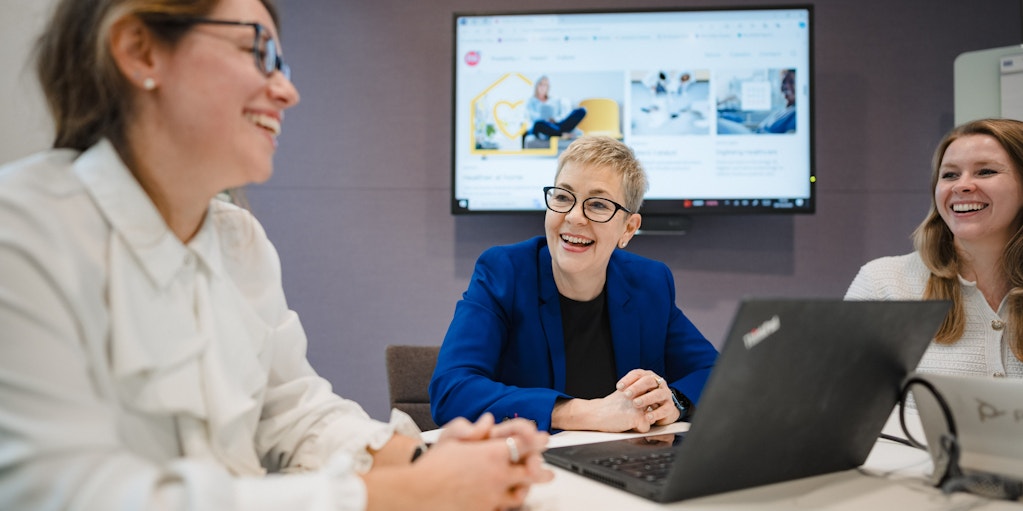
How has your work changed in the past few years?
The obvious change that everybody talks about in every sector is AI and digital. I had personal experience of that just the other day. I went with my partner to hospital, and he pointed out to me that he’d had two or three texts to remind him that he had an appointment. After the appointment, I joined a call in my role at PA, and exactly the same thing was talked about: avoiding wastage in the NHS through digital support such as texts and the NHS app to make sure people don't miss their appointments.
Another area of change is using imaging, remote monitoring or even remote consultations to avoid hospital visits. At one trust, a head and neck surgeon has been taking advantage of the community diagnostic centre, arranging for photos to be taken of the inside of people’s mouths and using the images to decide whether or not an abnormality might be a cancer. He then telephones the patient with the findings enabling them to find out sooner and avoids having to see more than 80 percent of patients in clinic. Not only do patients get an answer very quickly, they don’t have to visit an oncology clinic in the hospital which brings its own trauma. And the people who are at risk are also seen sooner as there is more time to devote to them.
There are lots of ways in which we’re using modern technology to improve patient experience and outcomes. The challenge is how we take those innovations and get uptake across a much wider group of people.”
I think the real challenge for the NHS is not so much whether great ideas are out there, because there are loads, but how do we spread and share and widen their adoption. Also, how can we use the evidence base, and the power of AI, big data, and digital, to understand what isn’t adding value?
One example is oncology follow-up. There are certain cohorts of patients where patient initiated follow-up, or PIFU, is just as, or more, successful than giving someone an endless series of regular follow-up appointments. You stop being paternalistic, and educate the patient about what to look out for. We’ve known for years that when patients relapse with cancer, they usually go back to their GP. There are also tests you can do. It might be a blood test, an X-ray, or a mammogram which gives all the information needed to confirm whether everything is as it should be. As long as the patient is feeling well, you can reassure them by post or telephone without the need for a hospital visit.
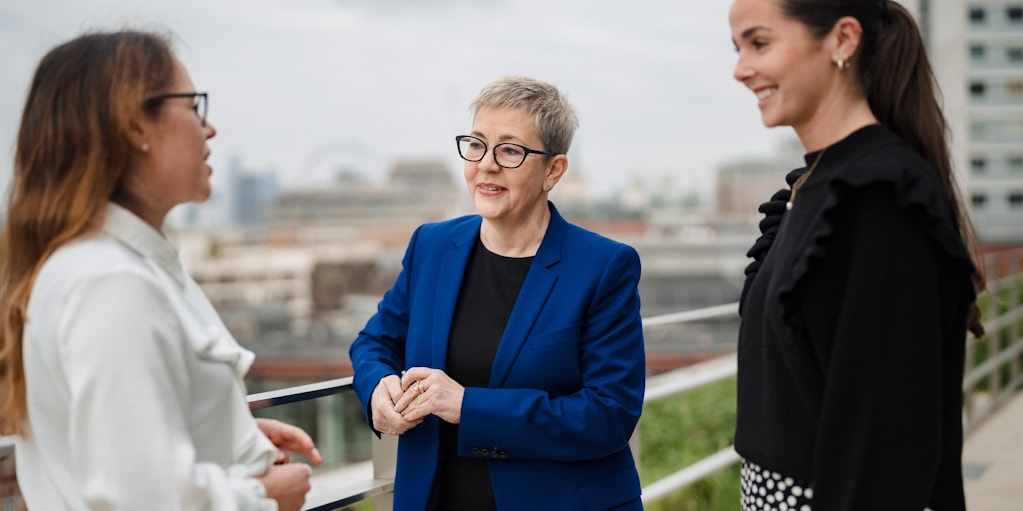
How does ingenuity come through in the work that you do?
We increasingly offer the opportunity to visit the Global Innovation and Technology Centre because it takes clients out of their normal working environment and is thought-provoking. When they do the tour of the GITC and hear stories of medical innovation, they find it inspiring.
In terms of ingenuity, our role – and it’s particularly relevant to PA’s heritage – is understanding what’s out there. We do a lot of work for big pharma companies on landscaping. How will the world evolve over the next 10 years, and what should you watch out for? How do you make yourself nimble enough to respond to changes that you might not have anticipated?
A good example of ingenuity from my training as a doctor is surgery for gastric ulcers and duodenal ulcers. I worked in a gastro ward, and we would have beds full of people having treatment which too often led to surgery. Then we discovered an infectious agent, Helicobacter pylori, that caused an awful lot of these cases, and began to treat patients with a combination of antibiotics and antacids. We didn’t need to do disfiguring surgery and take half the stomach out or remove the duodenum because we got to the root cause.
Another example would be cervical cancer and the development of an human papillomavirus (HPV) vaccine. When I started training in oncology, we knew nothing like as much as we do now. We certainly didn’t think we would be able to have a vaccine. Ideally, cervical cancer should be a thing of the past, because we can treat the root cause and stop the disease in the first place. The vaccine is probably dealing with well over 90 percent of cervical cancer cases where HPV is the cause.
What do you think is fundamentally important in order to treat more people in a more effective way?
Because of the situation the NHS finds itself in, if we carry on managing disease as we do at the moment, there won’t be enough people to deliver that care.
We have to be less paternalistic towards patients, and get them more educated about the impact of their behaviours, the importance of healthy lifestyles, and taking personal responsibility.”
AI and digital are part of that. If you create an environment where people are engaged, you can embed AI in everyday practice.
An example is imaging, where AI can read a chest X-ray more effectively than a human. But there is still a very important role for radiographers and radiologists because you need to continue to train the algorithm so that it gets better. You also need to know where the risks are, and continue to sample a proportion of X-rays for quality control. PA was involved in some work looking at the characteristics of people at risk of lung cancer and then using data from chest X-rays to identify higher risk groups to diagnose lung cancer earlier. Our client was very excited about that, and it’s now going through to the next stage.
Using AI and imaging does require professionals to understand that what they were trained for might change, because they’re now dealing with data and analysis, not just reading an X-ray. There’s a very strong case for saying that in certain areas, the vast majority of imaging should go through AI first to reduce the burden on doctors and get more effective results. As we start to do that, we’ll see more and more roles for AI and imaging in all sorts of aspects of medicine.
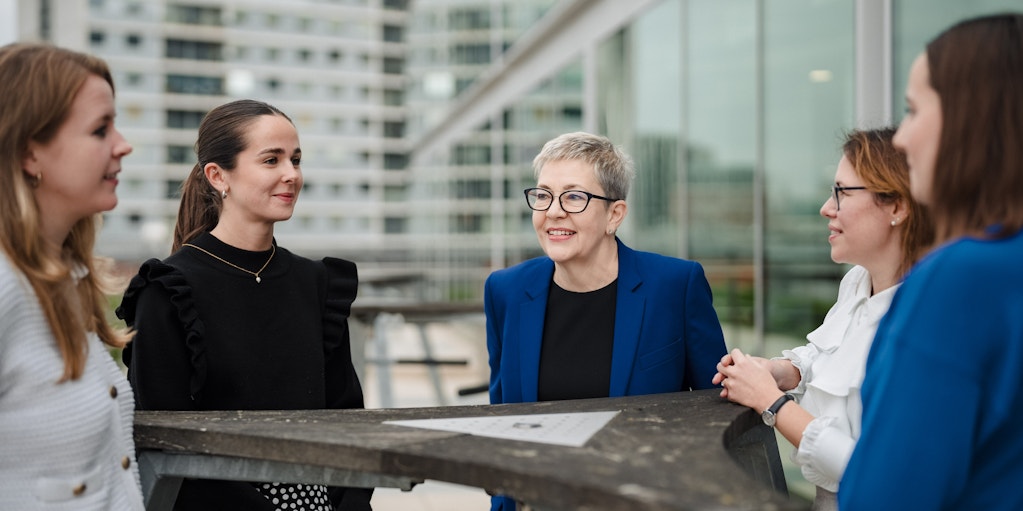
Which projects are you particularly proud of?
One project that comes to mind is in a complex area of medical technology where there are quite literally thousands of products that we’re helping to make sense of. We’re trying to create a taxonomy of which medical technology is available in the community, and identifying what else is needed. With tens of thousands of products, it’s really difficult. When somebody tries to order something specific for a particular group of patients, we’re trying to make it easier for them to understand the quality of the product and why it’s suitable for a particular patient. Yes, it should save money, but it’s mainly about better quality.
Companies need to work with governments and hospitals, rather than in separate silos. This improves the experience of healthcare professionals and patients, and means the industry has better guidance about which products it needs to innovate and improve on. One example is different colours of stoma bags, which you might not think is important, but if somebody has pale skin or dark skin, they won’t want to wear something that’s a different colour because it will show up underneath their clothes.
Our place development programme was one of the best things I’ve ever done in consulting. It was absolutely brilliant. We worked with 40 of the 42 integrated care systems on several worthwhile projects. Two or three of them identified male suicide as an area they want to focus on. What do we do to manage this crisis? Often, it happens in more deprived communities where there is unemployment, drug abuse, and more difficult family situations.
What advice would you give to somebody who wanted to make the impact that you make?
I think it’s about really understanding where you get your energy from, what makes you tick, and what motivates you. What do you want to look back on that you would be pleased to be involved in? One of the things about consulting is the massive variety. But there are aspects of it that don’t suit everybody. So, how do you get that balance right, and spend more time on things that energise you? Having been in the industry for 15 years, the joy of consulting is the opportunity to experience a range of sectors and aspects. For those at the beginning of their careers, you can learn about operating models, change management, economic evaluation, and so on. You get a taste of a huge range of things to give you an opportunity to think about what you actually want to do and work out your purpose.
What are your future goals?
In terms of my career, the thing that drives me is how we make things better for people. For me, it’s about making a difference through access to better drugs, improving the experience of patients, or empowering patients.
One thing about consulting is that it’s pretty all-consuming. So, from a creative point of view, I’d like to spend time creating a garden, and do a bit more of the digging and planting as well. I’d quite like to write more – I’ve always enjoyed writing. I’m also a fairly avid reader and I’d like to spend more time doing that.
What are you looking forward to right now?
I’m looking forward to seeing how my life evolves over the next five years, because there’s a bit of uncharted territory. I was reading about midlife crises and whether that’s actually an opportunity. You get to a point where you think, well, I’m probably not going to be Prime Minister now or win the Nobel Prize, but what will make me happy? I have this idea that I should give more than I receive. So, how will I help other people’s happiness? There are so many possibilities. I’m also looking forward to more travelling, and just learning to live in the moment.
Explore more
